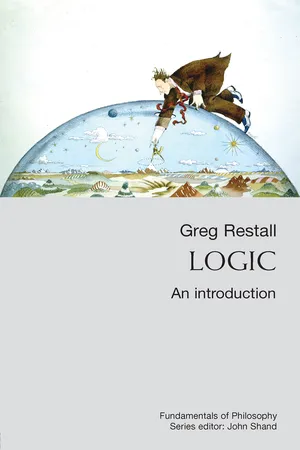
- 240 pages
- English
- ePUB (mobile friendly)
- Available on iOS & Android
eBook - ePub
About this book
The methods of logic are essential to an understanding of philosophy and are crucial in the study of mathematics, computing, linguistics and many other subjects. Introducing the major concepts and techniques involved in the study of logic, this authoritative book explores both formal and philosophical logic, and the ways in which we can achieve good reasoning. Individual chapters include:
- Propositions and Arguments
- Truth Tables
- Trees
- Conditionality
- Natural Deduction
- Predicates, Names and Quantifiers
- Definite Descriptions
This exceptionally clear introduction to the subject is ideally suited to students taking introductory courses in logic.
Tools to learn more effectively

Saving Books

Keyword Search

Annotating Text

Listen to it instead
Information
Topic
PhilosophySubtopic
Logic in PhilosophyPART 1
Prepositional logic
Chapter 1
Propositions and arguments
Logic is all about reasons. Every day we consider possibilities, we think about what follows from different assumptions, what would be the case in different alternatives, and we weigh up competing positions or options. In all of this, we reason. Logic is the study of good reasoning, and in particular, what makes good reasoning good.
To understand good reasoning, we must have an idea of the kinds of things we reason about. What are the things we give reasons for? We can give reasons for doing something rather than something else (these are reasons for actions) or for liking some things above other things (these are reasons for preferences). In the study of logic, we do not so much look at these kinds of reasoning: instead, logic concerns itself with reasons for believing something instead of something else. For beliefs are special. They function not only as the outcome of reasoning, but also as the premises in our reasoning. So, we start with the following question: What are the sorts of things we believe? What are the things we reason with?
Propositions
We will call the things we believe (or disbelieve) propositions. The particular name is not important here, but the distinction between propositions and other sorts of things is important. We express propositions by using sentences. If I ask you what I believe about something, you will most likely respond by using some sentence or other. Of course expressing propositions is but one of the things we do with sentences. We do lots of other things with sentences too—we ask questions, we express feelings, desires and wishes, we command and request. In the midst of this diversity, the acts of stating and believing are central to the practice of reasoning, so propositions are at the heart of reasoning and logic. We are interested in claims about the way things are, and reasons for them, so propositions, which express how we take things to be, or how we take things not to be (or which express matters upon which we are undecided), are the focus of logic.
We will illustrate the difference between sentences that express propositions and those that do not by exhibiting the contrast. Here are some examples of sentences expressing propositions:
I am studying logic. If you like, I will cook dinner tonight.
Queensland has won the Sheffield Shield.
The moon is made of green cheese. Most wars are horrible.
2+7=9. The mind is not the brain.
Euthanasia is justifiable in some circumstances.
There’s ...
Table of contents
- Cover Page
- Half Title page
- Series Title Page
- Title Page
- Copyright Page
- Dedication
- Contents
- Acknowledgements
- Introduction
- Part 1 Propositional logic
- Part 2 Predicate logic
- Bibliography
- Index
Frequently asked questions
Yes, you can cancel anytime from the Subscription tab in your account settings on the Perlego website. Your subscription will stay active until the end of your current billing period. Learn how to cancel your subscription
No, books cannot be downloaded as external files, such as PDFs, for use outside of Perlego. However, you can download books within the Perlego app for offline reading on mobile or tablet. Learn how to download books offline
Perlego offers two plans: Essential and Complete
- Essential is ideal for learners and professionals who enjoy exploring a wide range of subjects. Access the Essential Library with 800,000+ trusted titles and best-sellers across business, personal growth, and the humanities. Includes unlimited reading time and Standard Read Aloud voice.
- Complete: Perfect for advanced learners and researchers needing full, unrestricted access. Unlock 1.4M+ books across hundreds of subjects, including academic and specialized titles. The Complete Plan also includes advanced features like Premium Read Aloud and Research Assistant.
We are an online textbook subscription service, where you can get access to an entire online library for less than the price of a single book per month. With over 1 million books across 990+ topics, we’ve got you covered! Learn about our mission
Look out for the read-aloud symbol on your next book to see if you can listen to it. The read-aloud tool reads text aloud for you, highlighting the text as it is being read. You can pause it, speed it up and slow it down. Learn more about Read Aloud
Yes! You can use the Perlego app on both iOS and Android devices to read anytime, anywhere — even offline. Perfect for commutes or when you’re on the go.
Please note we cannot support devices running on iOS 13 and Android 7 or earlier. Learn more about using the app
Please note we cannot support devices running on iOS 13 and Android 7 or earlier. Learn more about using the app
Yes, you can access Logic by Greg Restall in PDF and/or ePUB format, as well as other popular books in Philosophy & Logic in Philosophy. We have over one million books available in our catalogue for you to explore.